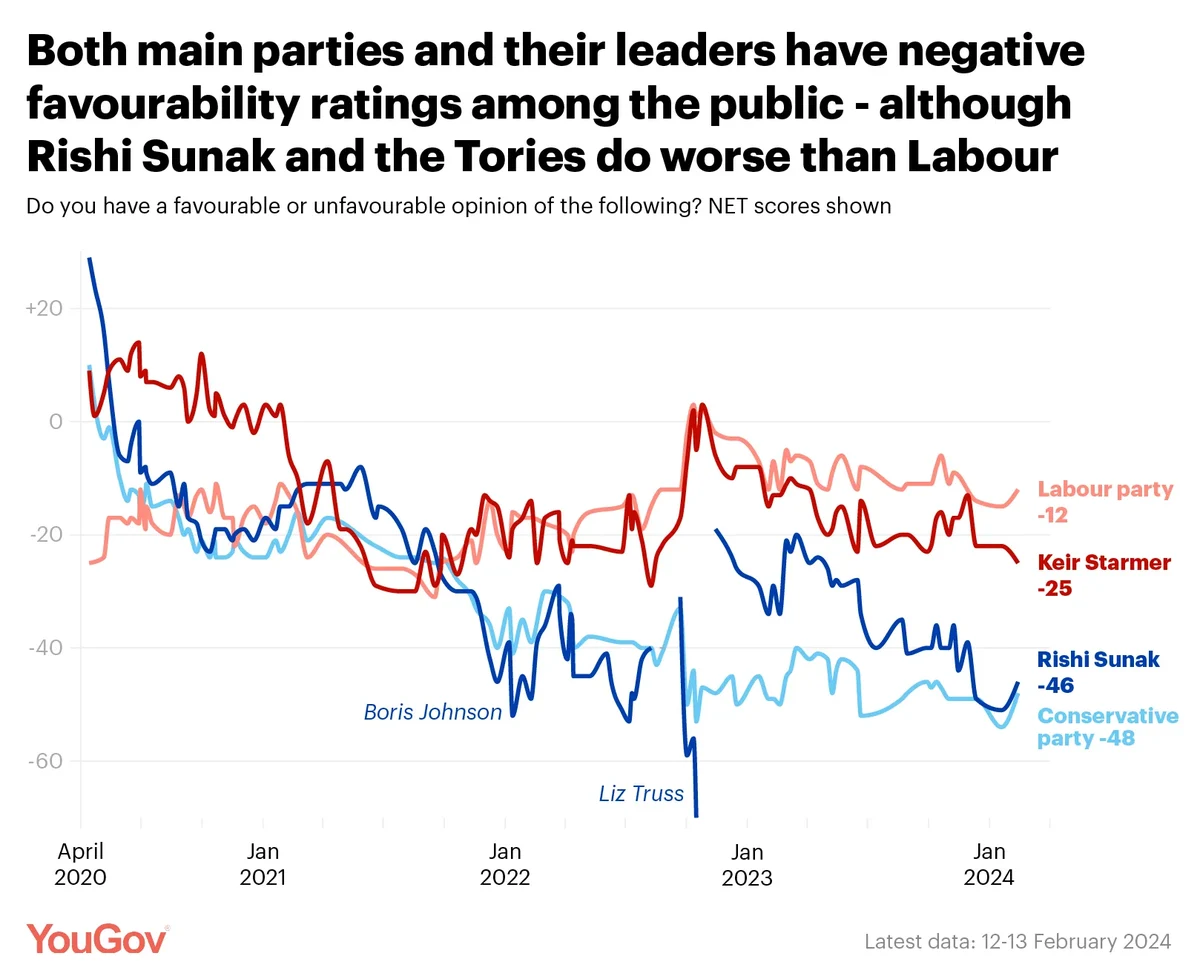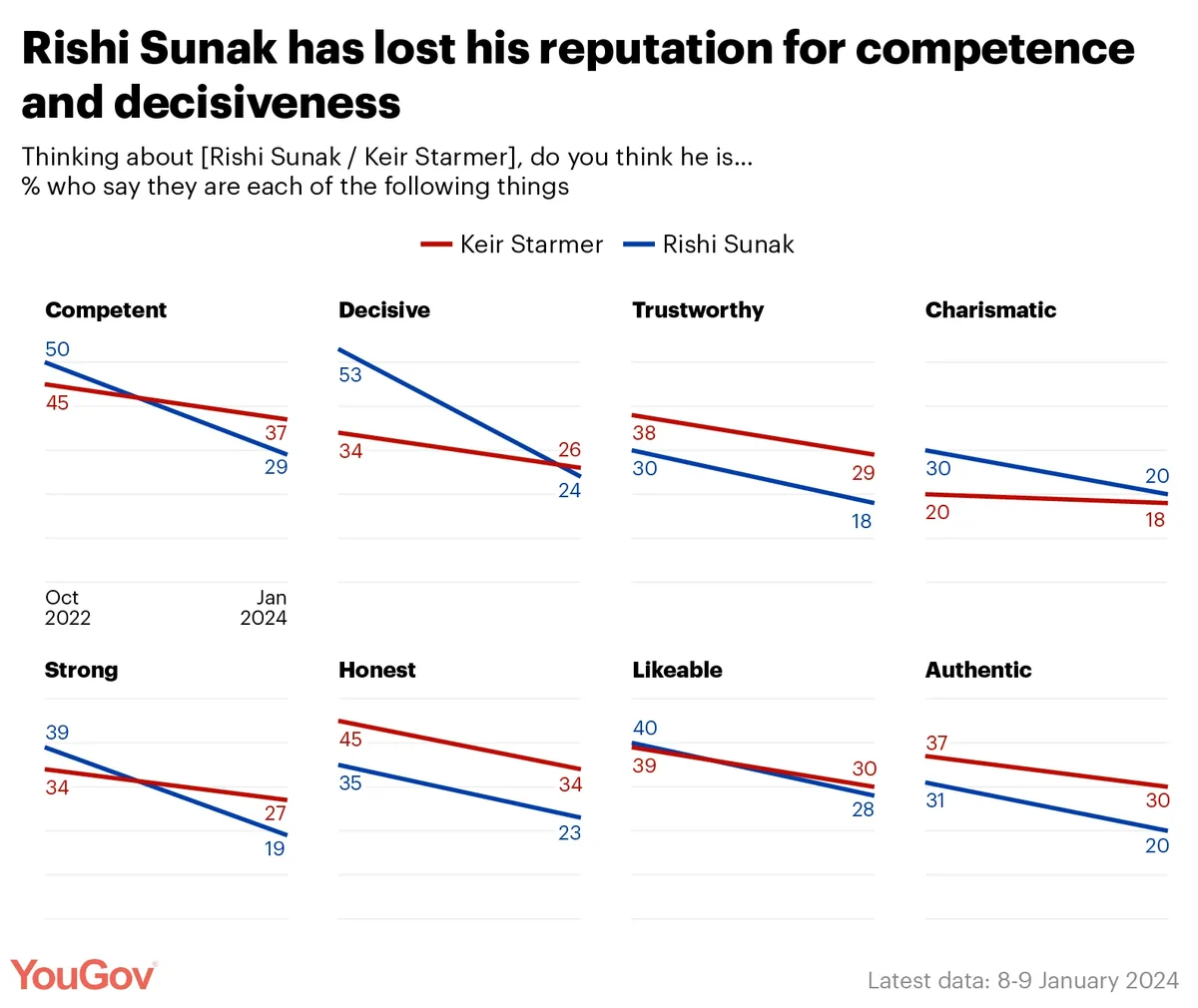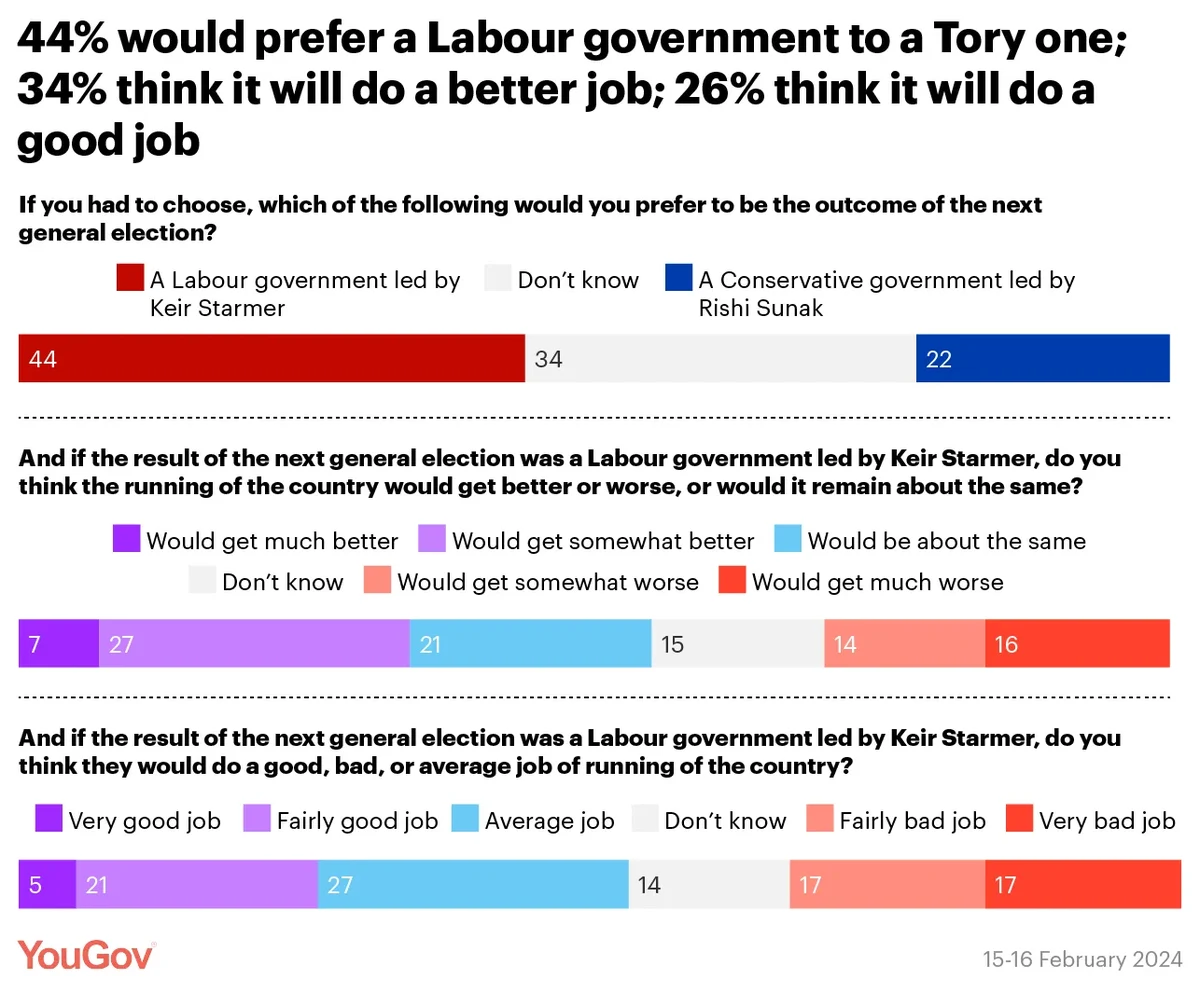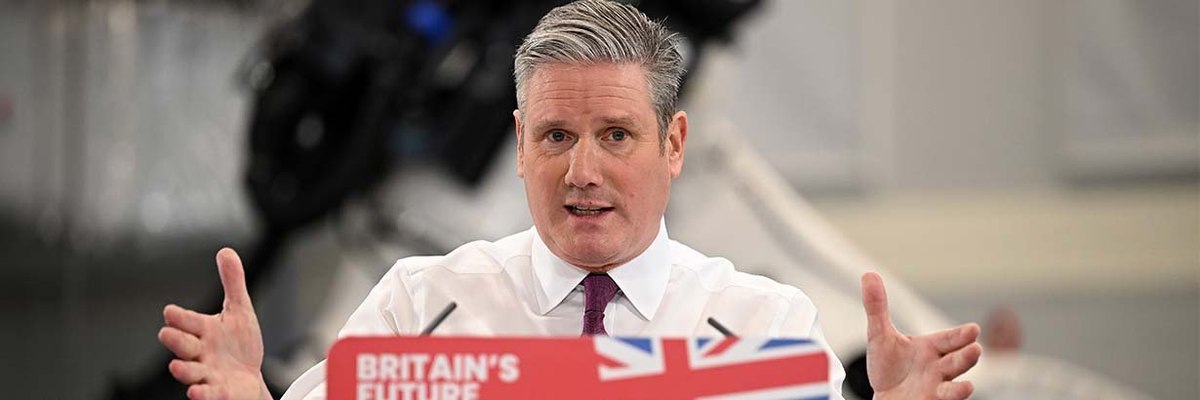The public say it’s time for change, and prefer Labour to the Conservatives, but expectations of the party are low
With Labour securing another brace of handsome by-election victories, the party’s victory at the forthcoming general election seems increasingly inevitable.
However, some have laid the charge at Keir Starmer’s door that his strategy seems to be simply to ‘limp into No 10’ off the back of dissatisfaction with the Conservatives, rather than making a compelling case for Labour.
Now a new YouGov study takes a deeper look at attitudes towards Labour and its leader. The results show that support for the party is lukewarm, with relatively negative attitudes towards Starmer and low expectations of a Labour government. Nevertheless, the public are driven by a desire to see the unpopular Tories removed from office, and in all regards Labour are seen as a preferable alternative.
How enthusiastically do Labour voters support the party?
The results of a voting intention poll conducted for this study (on 12-13 February) found Labour leading the Conservatives by 43% to 23%.
In a follow up to this standard question, we asked people to characterise the nature of their support for the party they intend to vote for.
Among Labour voters, 18% say that they “actively support them” – this is a consistent level with the other national parties, with 17-21% of all those currently intending to vote Conservative, Labour, Lib Dem, Reform UK or Green giving this answer.
The most common answer for all parties is likewise “I am not completely sure about them, but I do think they would do a better job than the main alternative”. For Labour this figure stands at 65%, compared to 73% for the Tories.
Another 12% of those who currently intend to vote Labour say they are doing so tactically, as they don’t think their preferred party would win in their constituency.
Starmer and the Labour party are unpopular – but the Conservatives even more so
When it comes to attitudes towards the parties, Labour are certainly more popular than their Conservative rivals – 39% have a positive opinion of the party compared to 22% for the Tories.
Likewise, Keir Starmer is more popular than Rishi Sunak, at 31% versus 23%.
However, Labour is still unpopular overall – in net terms the party’s favourability rating stands at -12, and its leader’s at -25.

Starmer has arguably become a drag on the Labour brand, with his own rating having been consistently lower than his party’s over most of the last year.
Looking more closely within the results shows that there is also notably less specific enthusiasm for Starmer than Labour. Among those intending to vote for Labour, 18% have a “very” favourable opinion of the party, while just 9% say the same of Starmer.
Britons think Keir Starmer would be a better prime minister than Rishi Sunak…
Keir Starmer has always led Rishi Sunak on the issue of who would make the best prime minister, by 34% to 23% in the poll for this study .
However, when we asked those who backed Starmer, most said they thought he was the better choice more because of Rishi Sunak’s weaknesses (58%) rather than his own strengths (30%).
This is not necessarily surprising, given the previous section showed that support for Labour is primarily based on their superiority over their main rival, rather than because they are outright supported.
It also may not be an uncommon finding for this kind of survey. In July 2022, this same question asked about Keir Starmer versus Boris Johnson found that 70% picked Starmer for best prime minister because of Johnson’s weaknesses, compared to 27% for Starmer’s strengths.
And in March 2017, the same question asked of Theresa May versus Jeremy Corbyn found 46% citing Corbyn’s weaknesses to 47% for May’s strengths. At this time, Theresa May was riding high in the polls at the time – surveys a month either side of this one gave her a net favourability rating of +6 to +10, compared to -40 to -42 for her Labour rival.
…but are split on how good a prime minister Starmer would be in his own right
Since early 2021, almost without interruption, the public have generally said that Keir Starmer has been doing badly as Labour leader – by 52% to 33% in our most recent tracker poll. By a similar proportion – 46% to 33% – Britons do not feel that Starmer looks like a prime minister in waiting.
Nevertheless, ever since Liz Truss’s disastrous budget in 2022, the general expectation is that Keir Starmer would become prime minister – 62% told us they thought this was likely in our most recent tracker survey.
So how do the public think well Keir Starmer would do as prime minister?
Expectations are divided. One in five (21%) expect Starmer to be great or good, while 31% think he will be average and 36% believe he will be poor or terrible.
Opinion among those who intend to vote for Labour is naturally much more positive – 50% expect that he will be great or good (although only 6% chose the “great” option). Most of the rest – 41% – expect that Starmer will make for an average prime minister, only 4% think he will be bad.
As ever, Starmer’s ratings are an improvement on his opponent’s. Most Britons say Rishi Sunak is a poor or terrible prime minister (56%), with 28% saying he is average and only 11% good or great.
Unlike for Starmer, those currently intending to back Sunak’s party tend to think he is an average prime minister (48%), rather than having a more favourable assessment of him (42%). And one in eleven current Conservative voters (9%) say Rishi Sunak is actively doing a bad job.
However, if we compare Starmer’s current figures to those for Rishi Sunak shortly before the latter took over as prime minister, we can see that they look pretty similar – a comparison he will probably not find flattering. In October 2022, 25% of Britons thought Sunak would be good as PM, 29% average, and 29% bad.
Expectations of Starmer are, however, a significant improvement on those for Liz Truss and Boris Johnson shortly before they took the reins – 50-52% expected them to be bad prime ministers.
Recent YouGov research on Starmer’s personal attributes likewise tells a consistent tale – that while generally outperforming Sunak on key traits like ‘competence’, perceptions of him remain lacklustre.

The results of this study can be read in more detail here.
Will things get better under Labour?
Despite lukewarm attitudes to the party, Labour is the clear preference for the next government – asked to choose between them, 44% of people picked “a Labour government led by Keir Starmer” compared to 22% who choose “a Conservative government led by Rishi Sunak”.
But when asked whether they think that the running of the country would actually get better under Labour, the number saying that it would falls to 34%. And only 26% of Britons think that Labour will do a good job at running the country.
If we also tally the figures to include those who think the running of the country will remain about the same under Starmer and Labour, then we get 55% saying things will either get better or stay the same under the new national management. Likewise, including the proportion who think Labour will do an ‘average’ job in government gives us 53% who think their performance in power will be average or better.

By comparison, only around a third think things will get worse under Labour (30%) and that they will be bad in government (34%).
A similar story plays out when it comes to the key issues facing the country at this present time.
The public want the Tories out
It may not matter so much that expectations for Labour are relatively low among the wider public, given the prevailing view is that, after 14 years of Conservative rule, it is time for a change.
Government approval has remained stubbornly low over Rishi Sunak’s time in office. Currently, just 16% of Britons say they approve of the government’s record to date – that figure has ranged between 11% and 20% since Sunak took over in October 2022.
Almost two thirds of the public (65%) disapprove of the government’s record to date – including 54% of those who voted for the party in 2019.
It should be no surprise, therefore, that most Britons (60%) say that it’s time for a change at the next general election – this includes a third (35%) of those who backed the Conservatives in 2019.
Only 21% say there is no need for a change.
Conclusion
Mediocre perceptions of Labour and its leader represent an obvious weakness for the party.
Their relative lack of popularity will make for a constant fear in some quarters that Labour are failing to pin down the voters they are bringing over from the Tories, and that their handsome polling lead could be eroded. There will therefore consistently be room to publicly question Labour’s electoral strategy and Starmer’s leadership, at a time when the party should be taking the fight to the Conservatives.
Nevertheless, a Labour victory is still the most likely outcome at the next election, with the Conservatives requiring an unprecedented recovery in order to reverse their current position.
Even so, on current figures Labour risks entering office without much political goodwill to work with, which may limit their room for manoeuvre in government.
See the full results here, here, and here
Photo: Getty










